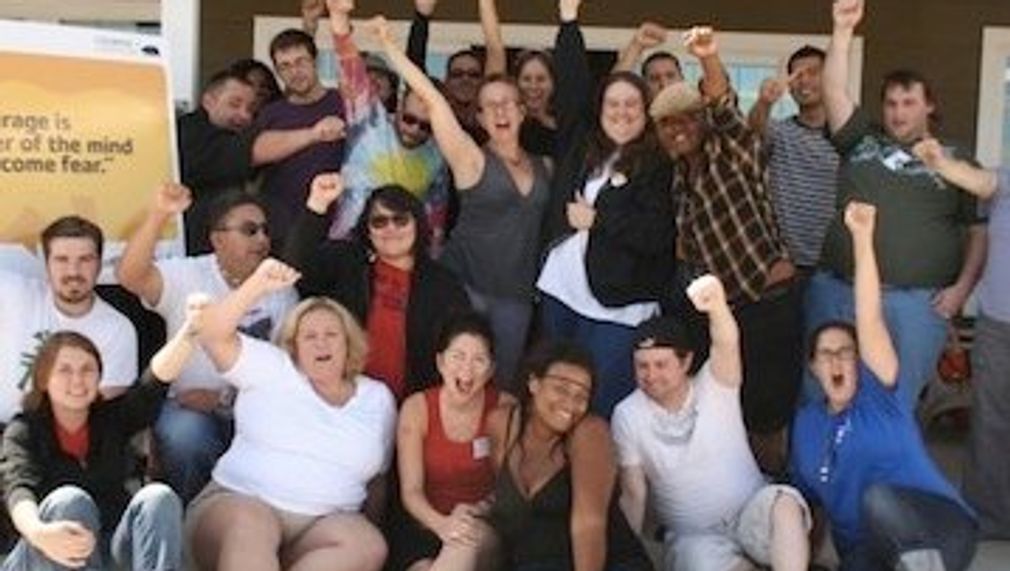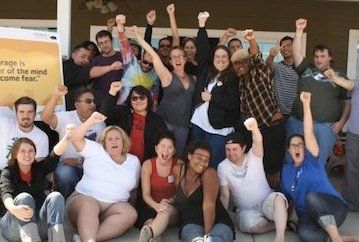Courage Campaign
Double Bubble: Courage won an unprecedented voting-rights victory after thousands of LA voters were disenfranchised by a flawed ballot design. As the LA Times highlighted in a front-page article, Courage uncovered the flaw and leveraged 32,802 petition signatures, and grassroots pressure to force the Registrar to count 47,153 ballots previously discarded. As a result, the County Registrar replaced the double-bubble ballot with a new ballot for DTS voters & the California Secretary of State revised ballot documents to clarify instructions statewide.
Prop 8 Trial Tracker: After gathering 140,671 signatures in three days calling for the Prop 8 trial to be televised, Courage launched Prop8TrialTracker.com, to promote transparency in the historic trial. US Supreme Court Justice Breyer referenced 138,542 public comments gathered by Courage in his dissenting opinion, in favor of televising the trial. Through live-blogging, coverage of breaking news, & expert commentary, the site gained over 4 million views & 100,00 comments. Our Equality on Trial website now provides up to the minute coverage of legal cases involving the rights of LGBT Americans.
Foreclosure Flashlight: In April 2012, following the introduction of the Homeowner Bill of Rights, Courage launched The Foreclosure Flashlight to shine a light on key California legislators, how foreclosures affected their districts, how much money they’d taken from the banking industry, & where they stood on a strong, pro-homeowner bill. The online tool encouraged Californians to contact their legislators. One by one, we won the key votes. This was an unprecedented victory over Big Bank lobbyists to pass fundamental reform ending the most deceptive & unethical foreclosure practices. We were proud to partner with the Alliance of Californians for Community Empowerment, California Reinvestment Coalition, Center for Responsible Lending, PICO, State Labor Federation, National Council of La Raza, Cal-PIRG, Consumers Union, Presente.org, & Rebuild the Dream.
Progressive Voter Guide: Each election season, Courage publishes the California Progressive Voter Guide. In 2012, the guide contained the recommendations of 14 progressive organizations, important deadlines including voter registration & vote-by-mail, a Spanish version, & a mobile-optimized version for voters to easily access even while voting. The Progressive Voter Guide was viewed more than 252,365 times.
Prop 30: Courage Campaign played a key role in creating and passing Prop 30 in 2012, which produced much-needed public revenue. Courage and partners created a ballot initiative, The Millionaire’s Tax, which was more progressive than the Governor’s revenue proposal. As a result of Courage’s research and organizing, along with partners, the Governor compromised to incorporate aspects of The Millionaire’s Tax & made Prop 30 more progressive & ultimately more feasible to pass, providing important revenue for vital services and education.
Visit this organization’s website to learn more

1 Submitted Idea
- 2013 Grants Challenge
Increase Voter Turnout Neighbor to Neighbor Communication and Govt Responsiveness

We will increase voter turnout in City elections by creating online engagement tools and opportunities for citizens to 1. communicate with and understand one another 2. build community that creates a stronger sense of ownership, connectedness and rootedness 3. hold elected officials accountable
We will use the latest proven online tools, and create some new ones, to leverage the power of the Internet and social media to turn make a lasting improvement in the city's social engagement and a replicable model for municipalities throughout the country.
Voter turnout in LA City elections is alarmingly low, at 21% in the last City election. Four out of five eligible voters in Los Angeles did not vote. (One get into the run-off for a Council seat with fewer than 2,200 votes.) Citizens are not engaged, and social scientists debate the barriers to collective action. For instance, citizens may not believe their votes make a difference. They may not believe that elected officials are responsive to specific voter needs. City residents may not consider themselves part of a community that values voting. In some cases, citizens may not know there even is an election or where to vote if they do know about it. More than likely a combination of these factors is at work. Key to a more socially-connected city, a brighter future, is increased voter participation and turnout.
We will begin by targeting and communicating with voters who registered online to vote. Our expertise is in online organizing and mobilization that results in offline action. We know that those who registered online have experience and interest in participating on line. Moreover, social, economic and political indicators clearly suggest that over time, an increasing number of people will be active and engaged on line. So the tools and systems developed now will have increased value and impact in the future, right into 2050.
What will we do? First, we will create a tool that gives citizens a means to amplify their voices and concerns and to learn what their neighbors are concerned about in a fun and measurable way. This is an online petition tool in the manner of signon.org, but hyper local. Individuals can create a petition and ask neighbors to add their voices. It could relate to traffic, environmental, health, commerce, education, public-safety, almost anything. Through this process citizens can share their concerns and learn what is on their neighbors’ minds. Communicating with and understanding one another creates greater engagement and improved quality of life.
Petitions can then be brought to the attention of traditional media and elected officials. Concerns and responses can be monitored as elections occur. Petitions may even lead to ballot measures. At the same time, an often-overlooked constituency – public workers – can benefit by knowing citizen concerns and being better enabled to meet their own professional and civic goals of solving public problems. Secondly, we’ll help create involvement, engagement, and concern about City election outcomes. We will ask citizens to “rank order” the list of petitioners’ concerns. The goal here is to urge citizens higher on a ladder of engagement with public policy, and to provide public education about some of the stakes in City elections. Results of the ranking will be communicated to respondents and publicized through online and traditional earned media.
Third, we’ll create social pressure for voting, and help establish a sense of community around participation, using an online tool with which we found success in 2012. In the last LA City election, more than 40% of the votes were cast by mail. To address these voters, our plan includes a Facebook tool that simply checks the names and hometowns of ones friends against the publicly-available records of who has mailed in ballots, updated each day. If all of one’s friends have voted, the tool shows it. If a few have not, it will tell the user who, and provide an opportunity to gently encourage them to vote. It's not too invasive, could hardly be simpler, and it gives voters a civic-minded excuse to log onto Facebook!
Finally, each communication will include basic logistics: the date of the next election and a link to a tool for finding one’s specific polling place. Also, we’ll hire an organizer to implement the project and we’ll advertise in traditional and new media to promote the tools.
Social connectedness will be enhanced by increased voter participation as citizens become more engaged with one another. As elections are understood more personally, and the impact of participation can be seen, citizens will become more rooted in the community where they play a role. As their ideas and concerns come to distinguish Los Angeles, citizens will more likely engage in volunteer activity, contributing in tangible ways to the place that reflects their values and includes their voices.